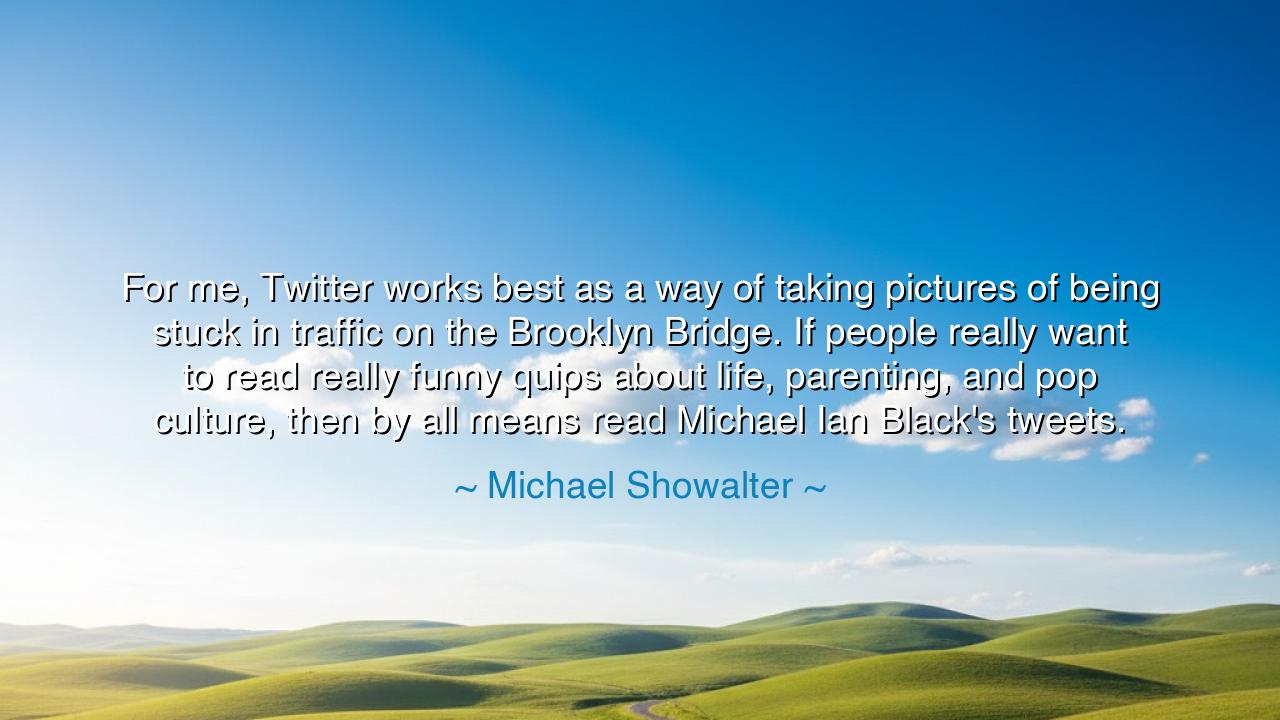
For me, Twitter works best as a way of taking pictures of being
For me, Twitter works best as a way of taking pictures of being stuck in traffic on the Brooklyn Bridge. If people really want to read really funny quips about life, parenting, and pop culture, then by all means read Michael Ian Black's tweets.






Hearken, O seekers of wisdom, to the wry and reflective words of Michael Showalter, who illuminates the modern landscape of communication and observation in the age of social media. He confesses that, for him, Twitter serves best as a mirror of the quotidian, a means of capturing the fleeting absurdities of life—such as being stuck in traffic on the Brooklyn Bridge—rather than as a platform for profound insight or moral instruction. In this, we see an enduring truth: that technology is merely a vessel, its value determined by the intention and discernment of the user.
The origin of this insight lies in the perennial human desire to share experience, to comment on life, and to participate in communal storytelling. From the oral poets of antiquity to the pamphleteers of early modern Europe, humans have always sought platforms to express humor, observation, and reflection. Showalter situates Twitter within this continuum, recognizing it as a tool that can be wielded lightly, for levity and connection, rather than gravely, as a source of edification or cultural authority. Social media, like the spoken word of old, thrives when its purpose is clearly understood.
Consider the life of Diogenes of Sinope, the ancient cynic, who wandered the streets of Athens, observing the absurdities of human behavior and responding with wit and demonstration. His observations were often humorous, grounded in everyday encounters, yet carried profound insights about human folly and virtue. In this, Showalter’s approach to Twitter echoes a timeless practice: using humor, situational awareness, and modest reflection to illuminate the human condition. It is not the platform that defines the wisdom, but the clarity of purpose and intention behind its use.
The emotional resonance of his reflection is profound. Parenting, pop culture, and daily life teem with moments of absurdity, frustration, and humor, and the capacity to observe these without gravitas is itself a skill. By acknowledging that others, like Michael Ian Black, may excel at humorous quips, Showalter exhibits humility and discernment—virtues central to the human endeavor across time. Humor becomes a means of connection, observation, and emotional relief, offering perspective on the trials of modern existence.
In practical terms, Showalter’s philosophy encourages careful consideration of the tools at our disposal. One must recognize that platforms like Twitter can amplify both insight and triviality, depending on usage. Historical examples, from the letters of Cicero to the journals of Enlightenment thinkers, reveal that the choice of medium influences both reception and impact. By selecting what to share and how, one cultivates discernment, prioritizing clarity, purpose, and resonance over mere volume or attention.
Showalter’s insight also carries a subtle moral dimension: the modern citizen must exercise judgment and humility in public expression. Not every platform is suited to profound commentary, nor is every individual obliged to provide it. To focus on one’s strengths, whether capturing humor in daily life or observing social currents with insight, is to act with wisdom, echoing the ancients’ recognition that self-knowledge is as vital as rhetorical skill. In this, he models restraint, reflection, and the judicious use of influence.
From this understanding arises a practical lesson: engage with tools of communication thoughtfully, honoring both their potential and their limits. Share observation, humor, and reflection in ways that align with your abilities and temperament. Celebrate the mundane, the absurd, and the everyday, recognizing that insight often arises from lived experience rather than abstract theorizing. Let the medium serve your purpose, rather than allowing it to dictate your message.
Thus, the teaching of Michael Showalter endures: Twitter, like all platforms, gains meaning from the discernment and intention of its user. Let all who wield such tools observe, reflect, and express with humility and humor. In doing so, they transform the ordinary—traffic, domestic life, and daily absurdities—into moments of shared recognition, laughter, and insight, proving that even in the most modern arenas, timeless truths about human observation, connection, and expression continue to flourish.






AAdministratorAdministrator
Welcome, honored guests. Please leave a comment, we will respond soon